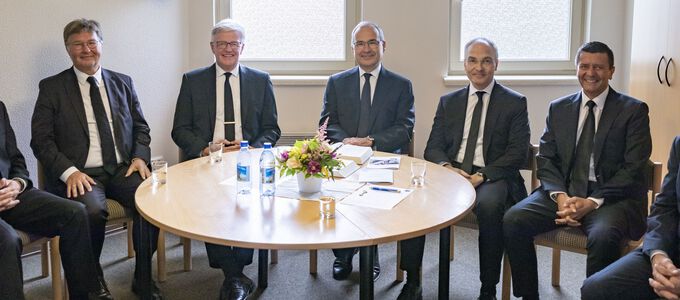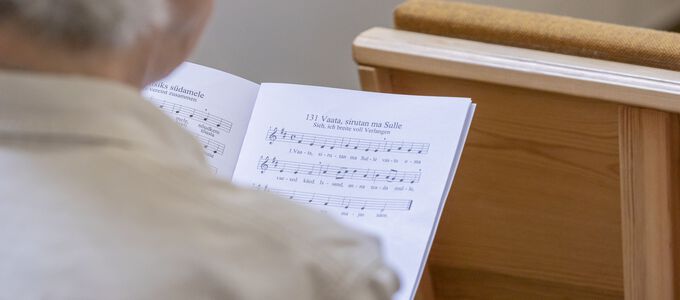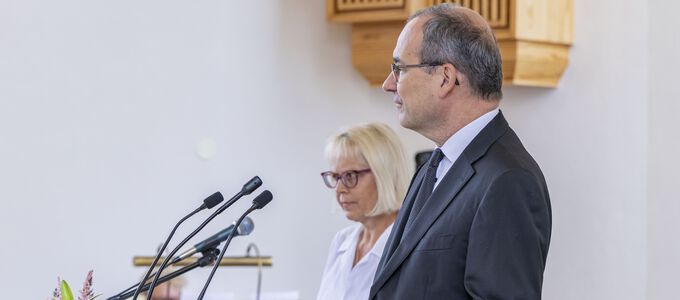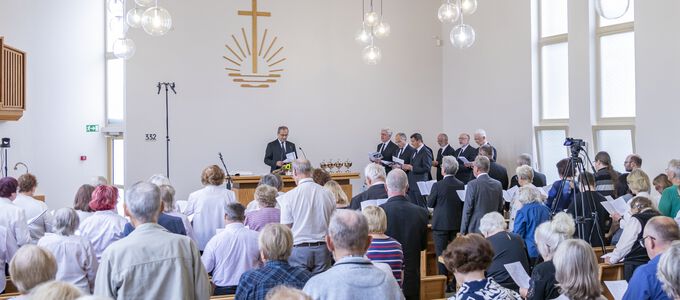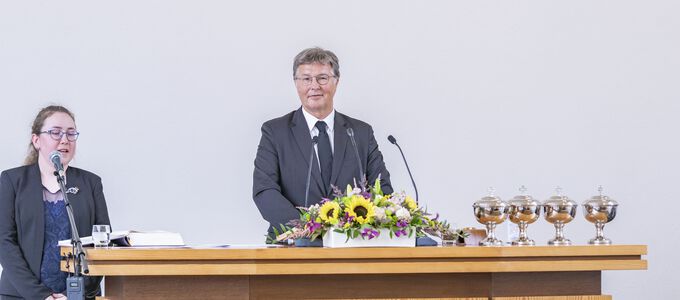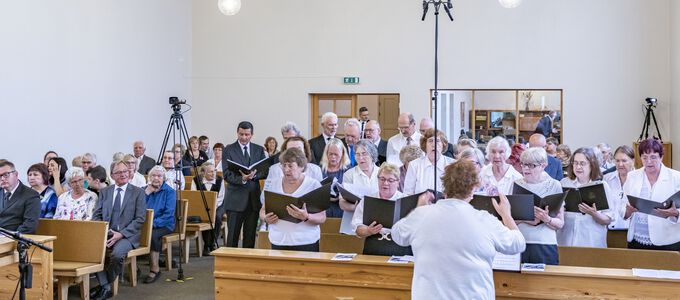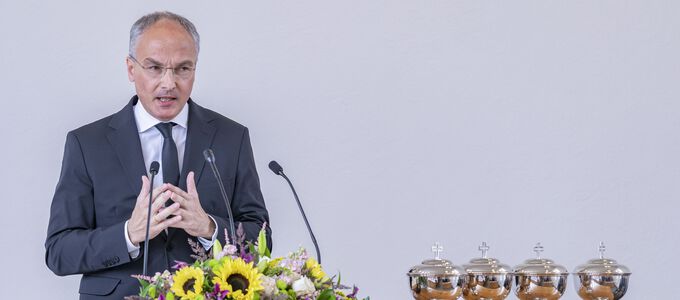
Anyone who longs for the peace of God must first be sanctified—and must even contribute to the sanctification of others. Just how this works was explained by Chief Apostle Jean-Luc Schneider in a divine service he recently conducted in Estonia.
After his visit to the Congo, the international Church leader made his way to the picturesque town of Paide, Estonia. “On any given Sunday morning in the Democratic Republic of Congo there are more attendees in divine service than there are citizens of Estonia,” he laughed. But no matter: “God loves and needs every single chid of God.”
The divine service in Paide took place on 24 July. The Chief Apostle served the brothers and sisters there with a passage from 1 Thessalonians 5: 23–24: “Now may the God of peace Himself sanctify you completely; and may your whole spirit, soul, and body be preserved blameless at the coming of our Lord Jesus Christ. He who calls you is faithful, who will also do it.”
The God of peace
“God wants to give His children peace,” said the Chief Apostle. But what is this peace? “The peace of God is a state of wellbeing. This peace consists of human beings living in harmony with God and with one another,” explained the Chief Apostle. The plan of God is to grant this peace to all people.
To come to God is not quite so easy at first glance: “People can only have fellowship with God if they conform very precisely to the will of God. But no human being can manage that!”—Not on their own, in any case.
“Nevertheless, this is indeed possible with the help of God,” said the Chief Apostle. This is because God sanctifies human beings:
- through Jesus Christ: “He has sanctified Himself for us. He was the perfect Man, who had never committed a single sin. And He gave His life as a sacrifice so that we could be cleansed of our sin.”
- through belief in Jesus Christ: “Those who believe in Jesus Christ can also receive forgiveness of sins. And they will then be purified.”
- through the Holy Spirit: “The gift of the Holy Spirit has been laid into us. This is how we were empowered to become a new creation.”
- through His word: “And this new creation within us is nourished through the word and Holy Communion. It is in this way that God seeks to sanctify us completely, so that we may be worthy to enter into His kingdom.”
Instruments of God
“God wants to offer His peace to all human beings,” said the Chief Apostle. “And it is also for this reason that He has called us and sanctified us. This means that He has set us apart and singled us out to be instruments in His kingdom.” He does not love these people more than all the others, but He needs them to be instruments in His hand.
Anyone who is in agreement with this can be an instrument in the hand of God. One does not need to be perfect in order to serve in this capacity. “The only thing that the dear God expects of us is a perfect love,” said the Chief Apostle:
- love for God: “If we love God with our whole heart, then we will feel the urge—the need—to be with Him. And if this longing, this desire, lives within us—namely to be with God—we will want to have fellowship with Him, and then God can sanctify us.”
- and love for our neighbour: “If this love for our neighbour lives within us, then we will feel the need to help our neighbour see Jesus Christ as well. And it is on the basis of this love that God can sanctify us to be an instrument in His hand.”
“Completely” means “through and through”
That God sanctifies us completely signifies that He sanctifies the soul, the body, and the spirit. After all, in order for the soul to be sanctified, it needs a mind and a body. “The body must come, must hear the word, and must receive Holy Communion, and the mind has to process this word,” explained the Church leader. That is why it is also important to satisfy the needs of the body and mind in harmony with God’s will. “Mind and body also need sufficient energy in order to serve God and their neighbour,” warned the Chief Apostle.
It is not the state of our body and mind that is decisive for serving God and our neighbour, incidentally. “Whether you are young and powerful, or already high in age and very fragile, whether the mind is still very fit, or only limited in capacity. As long as our relationship with God is in order, God can make use of us.”
Blameless before God
There was still one other word from the Bible passage that the Chief Apostle wanted to examine more closely, namely the word “blameless”. If God sanctifies us, then He can makes us blameless. “Those whom God does not reproach are blameless before Him,” explained the Chief Apostle. After all, God could indeed reproach us
- for not using the gifts He has entrusted to us: “God has given us life, time, energy, and so on. We must engage these gifts that we have been given. Let us take strength and time in order to sanctify ourselves and serve our neighbour.”
- for having the wrong attitude of heart and mind even though we may well serve with our body: there are people who do good works out of personal interest and not out of love. “Not because they want to please God, but because they want to please human beings. And not out of love, but because there is something they want from them.”
- for the opposite, namely that the mind and spirit accept the teachings of Christ, but the body does not put them into practice: “There are people who are very faithful in spirit, and who love God and their neighbour in spirit, but the body does absolutely nothing. Many words, but no deeds.”
- for not seeking fellowship with believers: “God will reproach those who remain loners and who do not wish to gather with others. He will tell them: ‘I wanted to incorporate you into My people, but you did not want this. Your relationship with Me was not in order. You did not manage to become one with your brother and your sister.’”
But the Church leader went on to reassure his fellow believers: “None of this will happen if allow ourselves to be sanctified.”






